Cheap Futures Prop Firms: Activation & Monthly Fees Breakdown
When choosing a futures prop firm, it’s important to evaluate the total cost - not just the advertised evaluation fee. Costs can include activation fees, monthly fees, and reset charges. Some firms offer one-time fees, while others rely on recurring subscriptions. Here's what you need to know:
- FundingTicks Futures: Monthly evaluation fee (e.g. $138/month for 50K). After passing, a one-time capital activation deposit (shown as $5,000 on the 50K tier) applies before funded capital begins.
- Apex Trader Funding: Frequent discounts but includes activation fees and resets.
- Bulenox: $96 evaluation fee + $148 activation fee; total cost $244.
- BluSky Trading: $105/month with no activation fee; reset costs $85.
- My Funded Futures (MFFU): $73.15 evaluation; no activation fee.
- TickTick Trader: Month-to-month fees; pricing varies.
- Day Traders: $189.50 evaluation + $130 activation fee; total cost $319.50.
- Phidias Propfirm: Pricing unclear; check directly for details.
- FundedNext Futures: $72 or $90 evaluation depending on track; no activation fee.
- Tradeify Futures: Hybrid model; details on fees need confirmation.
Quick Comparison
| Firm | Evaluation Fee | Activation Fee | Monthly Fee | Reset Fee | Platform Support |
|---|---|---|---|---|---|
| FundingTicks Futures | N/A (subscription model) | Not specified | ~$138/month (50K) | None | NinjaTrader + Tradovate + Rithmic |
| Apex Trader Funding | Varies (discounts) | Yes (varies) | Varies | Varies | Rithmic |
| Bulenox | $96 | $148 | Not specified | Not specified | Unclear |
| BluSky Trading | $105/month | None | Included | $85 | NinjaTrader, Tradovate |
| My Funded Futures (MFFU) | $73.15 | None | None | Moderate | Rithmic, NinjaTrader |
| TickTick Trader | Varies | Not specified | Varies | Not specified | Rithmic, NinjaTrader |
| Day Traders | $189.50 | $130 | None | Not specified | Rithmic, NinjaTrader |
| Phidias Propfirm | Unclear | Unclear | Unclear | Unclear | Unclear |
| FundedNext Futures | $72 or $90 | None | None | $70-$88 | Tradovate, NinjaTrader |
| Tradeify Futures | Unclear | Unclear | Unclear | Unclear | Rithmic (confirm details) |
To save money, confirm all costs directly with the firm and look for promotions. Firms like FundingTicks and MFFU offer simpler pricing, while others like Apex and BluSky focus on discounts or monthly models. Choose based on your trading needs and platform compatibility.
The BEST Prop Firms (2025)
1. FundingTicks Futures
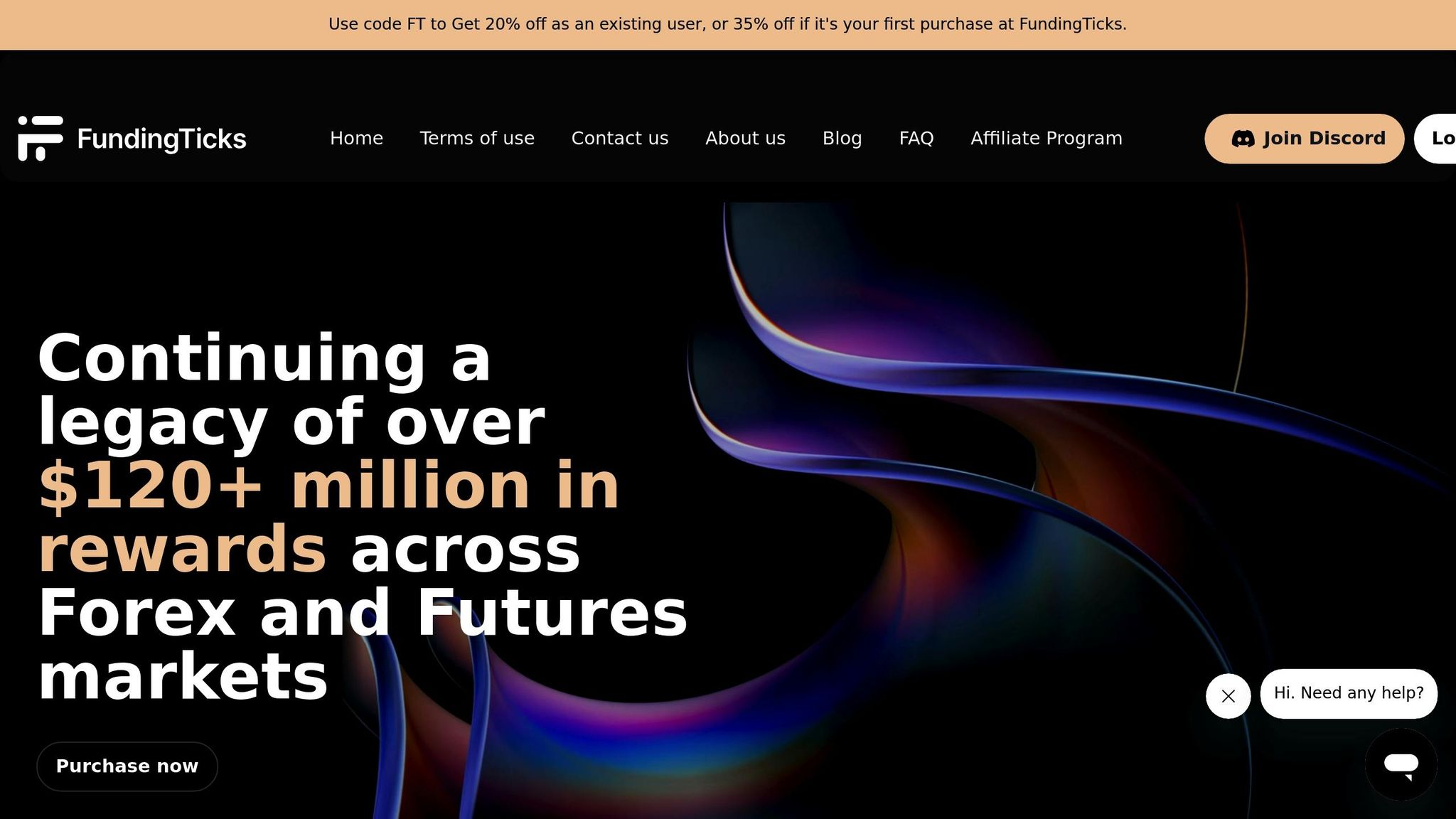
FundingTicks Futures has gone through multiple model changes over the last 24 months, and older information online is often outdated. As of the most recent public pricing interface (2025), FundingTicks utilizes a subscription-based evaluation model, not a zero-evaluation instant-funding model.
Traders pay a monthly evaluation fee (for example, the 50K tier is currently displayed at $138 per month) for the “Student / Evaluation” stage. Once the evaluation conditions are satisfied and the trader progresses into the “Master” stage, a one-time capital activation deposit is required. On the current pricing page, this activation figure is displayed at $5,000.
In other words, FundingTicks is presently structured as:
- Monthly billing during the evaluation phase
- One-time capital activation fee after passing (prior to Master Stage live capital access)
- No recurring monthly fee indicated during Master Stage itself
This shift is important because historical advertisements / blog posts / Reddit threads frequently still reference FundingTicks’ older structure (zero evaluation / one-time only). That era appears discontinued — the current offering is recurring monthly evaluation plus a final capitalization deposit.
Platform connectivity continues to be Rithmic-based, so compatibility is generally aligned with NinjaTrader, Quantower, R|Trader Pro, and other Rithmic workflows.
2. Apex Trader Funding

Apex Trader Funding offers promotional discounts of up to 80–90% on its $25K evaluation fee. However, traders need to confirm live pricing, as these discounts are often time-sensitive and subject to change. This pricing structure provides a foundation for understanding the overall costs involved during both the evaluation and post-funding phases.
The firm follows a traditional evaluation process, with additional costs like activation and reset fees contributing to the total expense of obtaining funding. While the discounts are appealing, it’s essential to note that specific details regarding recurring monthly and reset fees after funding are not clearly outlined. Traders should verify these charges directly with the firm to avoid surprises.
For platform integration, Apex Trader Funding supports Rithmic, but compatibility with Tradovate is unclear and requires further investigation.
To make the most of Apex Trader Funding’s offerings, it’s wise to stay updated on their promotions and confirm all pricing details before committing to the application process.
3. Bulenox

Bulenox provides a $50,000 evaluation account with an evaluation fee of $96. Once you pass the evaluation and get funded, there’s an additional activation fee of $148. This brings the True Cost to Funding to $244. These fees outline the basic cost structure for traders interested in Bulenox.
Currently, there are no promotional discounts mentioned for their evaluation tier. If you’re looking for potential promotions, it’s a good idea to check directly with Bulenox for any updates.
Details about monthly fees after funding are not specified, and the reset cost isn’t outlined either. Additionally, there’s no information on platform compatibility, such as support for Rithmic or Tradovate. To avoid surprises, confirm these details before committing.
While Bulenox provides transparency with its separate evaluation and activation fees, the lack of clarity around ongoing monthly fees, reset costs, and platform integration highlights the importance of verifying the latest terms directly with them.
4. BluSky Trading
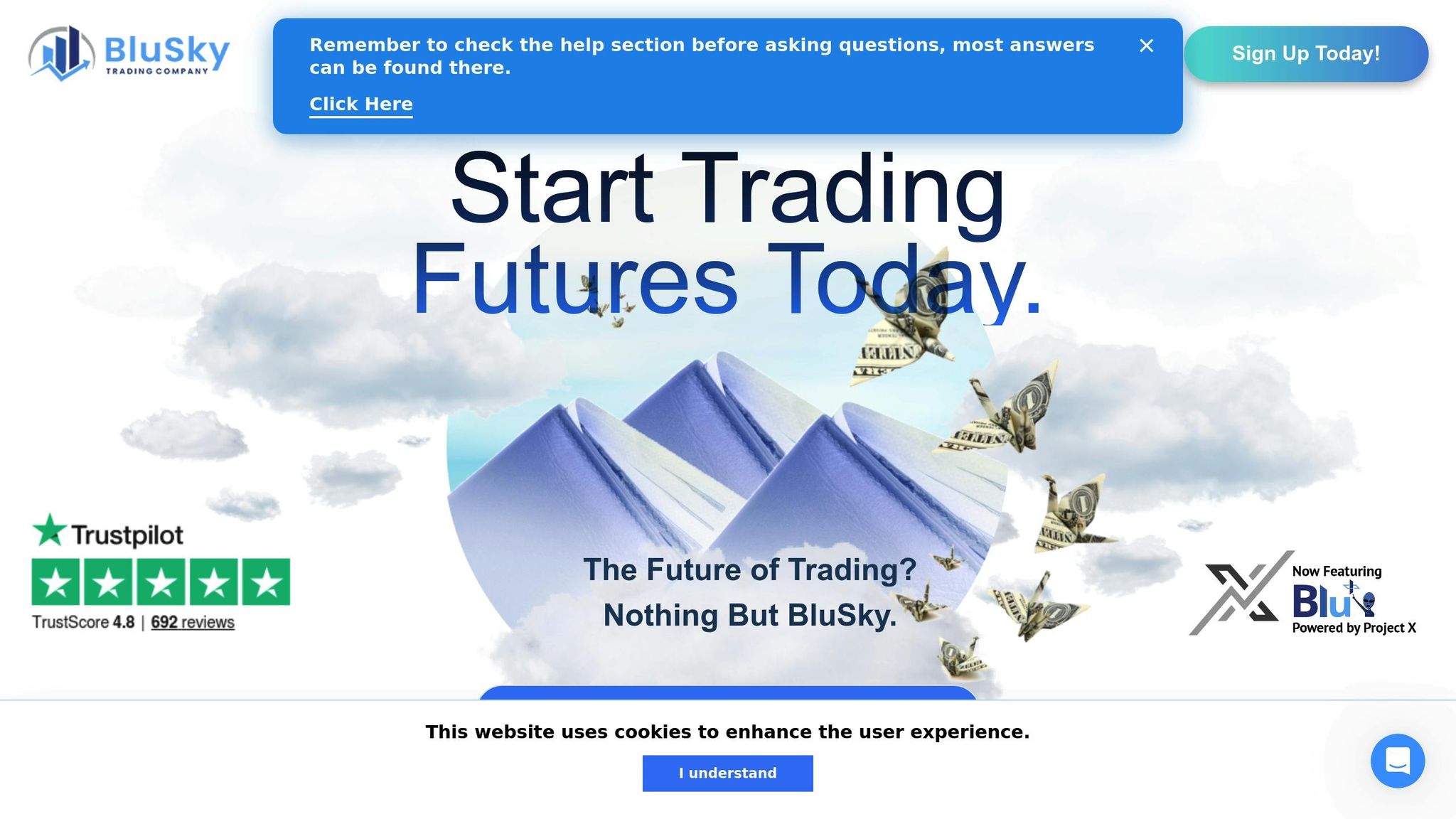
BluSky Trading offers its Advanced 25K account for $105 per month. Unlike firms with one-time evaluation fees, BluSky uses a monthly subscription model. This approach means your progress doesn’t reset at the end of the month, providing a consistent evaluation experience.
One of the standout features is the absence of an activation fee. Once you pass the evaluation, you can access your funded account without paying extra. Resetting your account costs $85, but renewals come without this fee.
The evaluation process is refreshingly simple. To qualify, you need to:
- Achieve a $1,500 profit over a minimum of eight trading days.
- Maintain a trailing drawdown above $1,200.
- Keep daily losses under $600.
With just two failure conditions to manage, their evaluation model is more straightforward than many others.
"It's hard to find a company that provides a real funded account that doesn't require a bunch of hoops to jump through and complicated steps and restrictions. The rules are as simple as they get." - Killa Gorilla
"It's hard to find a company that provides a real funded account that doesn't require a bunch of hoops to jump through and complicated steps and restrictions. The rules are as simple as they get." - Killa Gorilla
On the platform side, BluSky supports NinjaTrader, Tradovate, and TradingView. While Rithmic isn’t mentioned, the inclusion of Tradovate ensures direct market routing for futures trading.
NEVER MISS A TRADE
Your algos run 24/7
even while you sleep.
99.999% uptime • Chicago, New York, London & Amsterdam data centers • From $59.99/mo
Traders seem to love BluSky's approach, as reflected in their 4.7/5 rating from 391 reviews. Many highlight the clear rules, daily payouts, and transparent fees as major positives. However, some note the two-account limit per trader as a minor downside.
"BluSky actually wants you to succeed. Because unlike other firms that make money from failed evaluations, they make money when you make money in the real market." - Will M.
"BluSky actually wants you to succeed. Because unlike other firms that make money from failed evaluations, they make money when you make money in the real market." - Will M.
Once funded, traders start with an 80% profit split, which can increase to 90%. BluSky also offers daily withdrawals, making it easier to access your earnings. Next, we’ll take a closer look at My Funded Futures (MFFU), another provider with an affordable model.
5. My Funded Futures (MFFU)
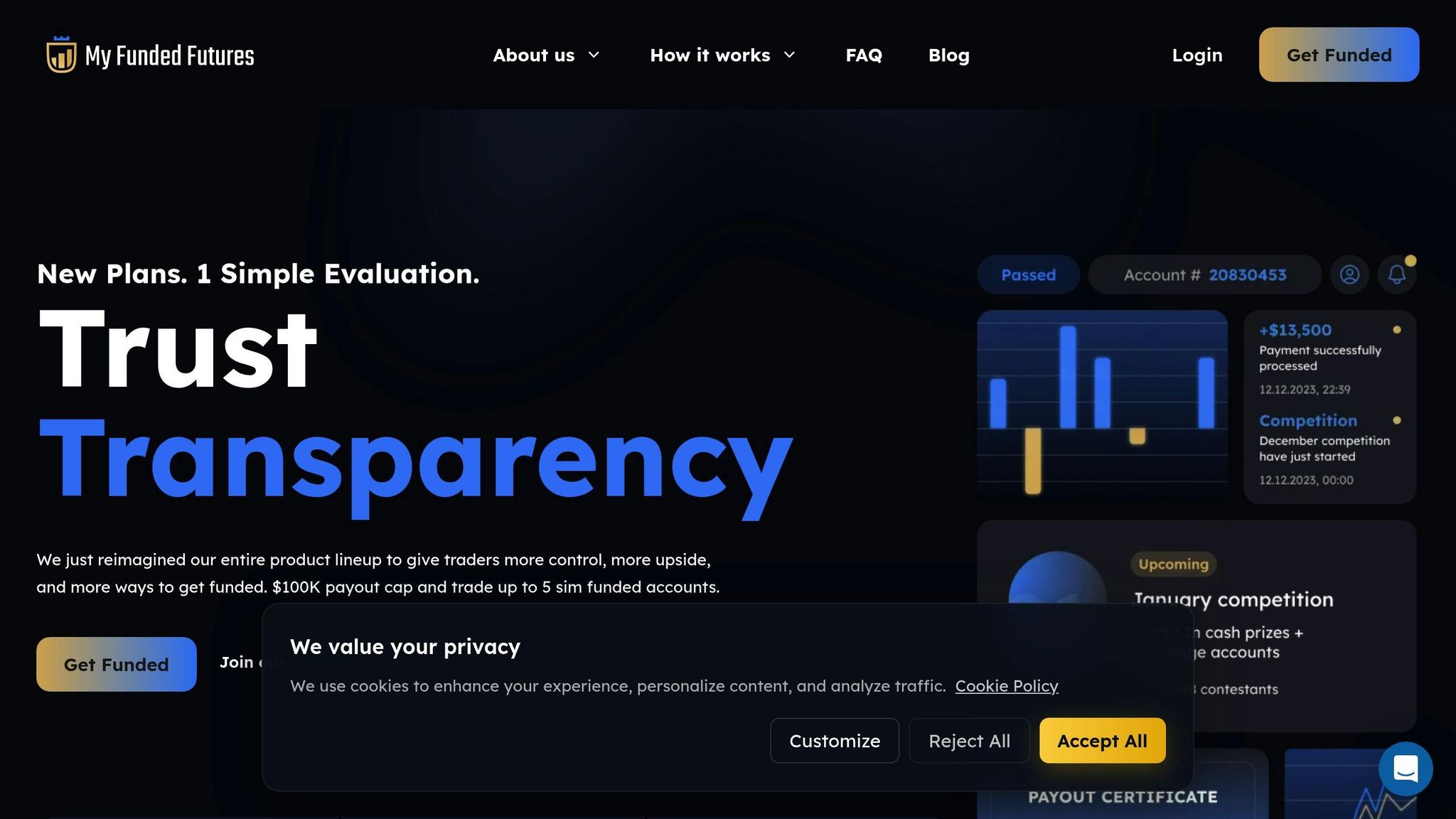
My Funded Futures keeps things straightforward with its pricing - offering a $50,000 evaluation for $73.15, and there’s no activation fee involved. This means the total cost to get funded, if you pass without needing a reset, is exactly $73.15.
To put that in perspective, Apex Trader Funding has a true cost-to-fund of $96.10, while FundingTicks comes in slightly lower at $68.00.
MFFU also uses Rithmic data feeds, which provide dependable market connectivity for futures trading. The platform works seamlessly with well-known trading tools like NinjaTrader and Quantower, giving traders access to professional-grade software without tacking on extra platform fees. This integration highlights MFFU's focus on delivering a smooth trading experience.
With its straightforward pricing, MFFU makes it easier to plan your initial trading expenses.
6. TickTick Trader
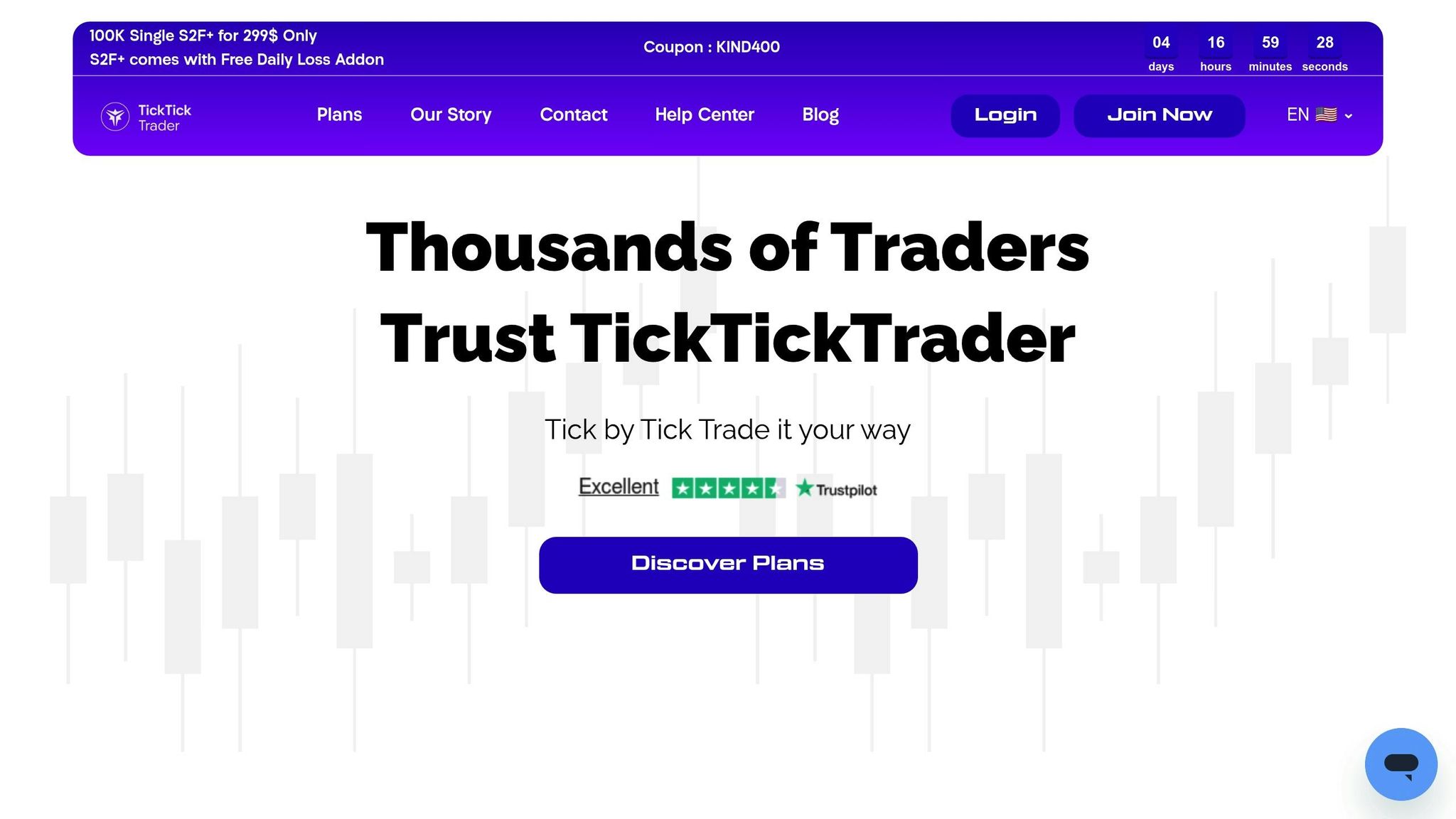
TickTick Trader provides a flexible month-to-month structure, making it a great choice for traders who prefer to avoid long-term commitments. This setup is ideal for those who may need to adjust or pause their evaluations based on changing circumstances. Be sure to check their website for the most up-to-date pricing, as rates can vary.
The platform supports Rithmic data feeds, offering dependable market connectivity. This compatibility works seamlessly with popular trading platforms like NinjaTrader and Quantower, giving traders access to professional-grade tools without incurring extra platform fees. This reliable connectivity pairs well with their adaptable evaluation terms.
Before committing, confirm details about reset and monthly fees directly with TickTick Trader. Since promotional offers and fees can change weekly, it’s important to verify live pricing. Also, double-check for any activation fees or hidden costs that might not be immediately obvious in their marketing materials to ensure an accurate understanding of overall costs.
7. Day Traders
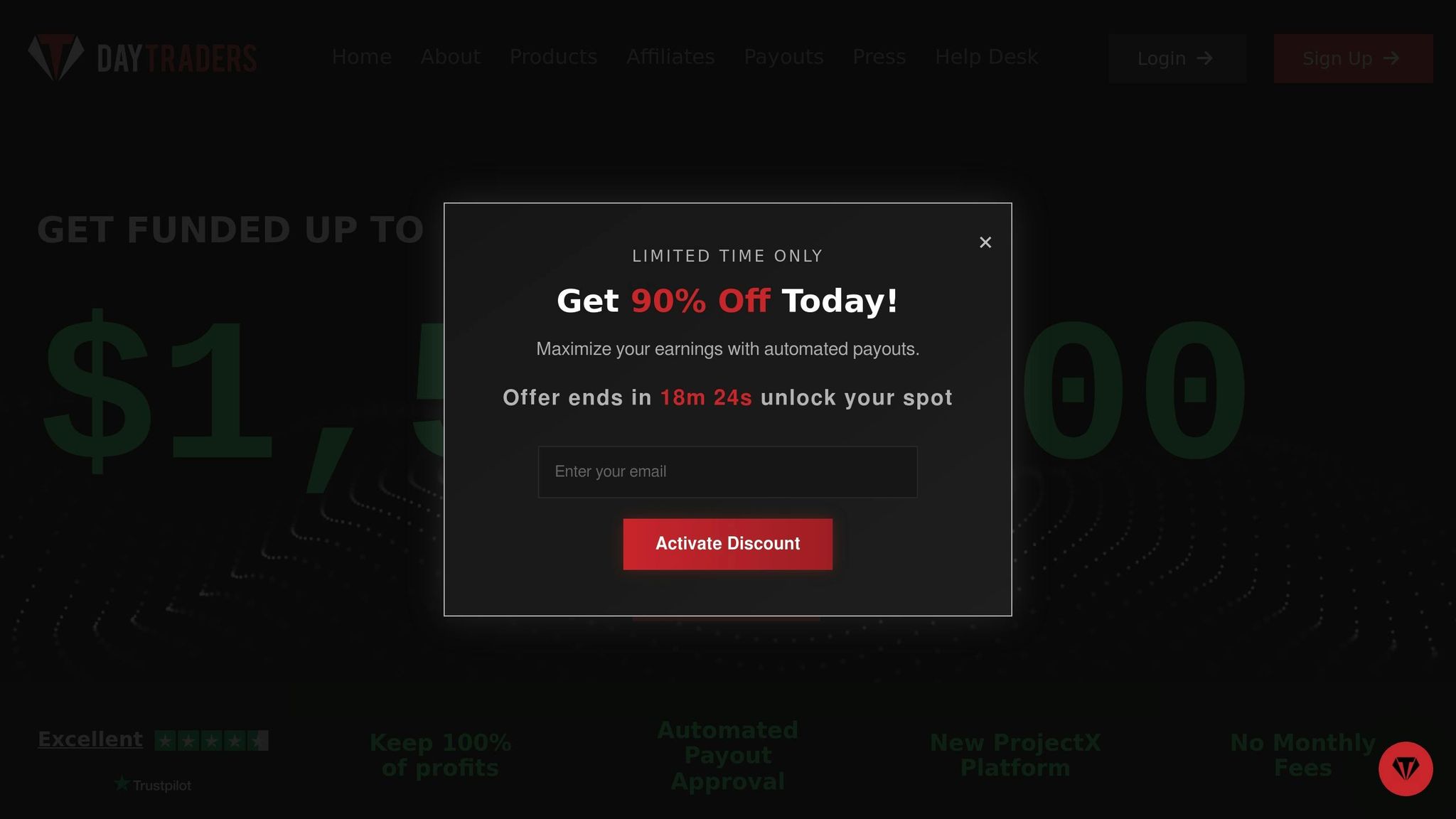
Day Traders, which entered the market in 2025, takes a unique approach with its dual-fee structure. When they launched, they introduced promotional pricing to attract traders, focusing on keeping evaluation costs competitive while maintaining a straightforward fee system for reaching a funded account.
For their 50K evaluation tier, the firm charges an evaluation fee of $189.50 and an activation fee of $130.00, bringing the total cost to $319.50. While this pricing is on the higher side compared to some competitors, it reflects their focus on offering a clear and structured path for traders.
Day Traders provides access to Rithmic data feeds, ensuring dependable market connectivity that integrates well with platforms like NinjaTrader and Quantower. By relying on Rithmic, they align with industry standards for fast and reliable market access. However, as a newcomer, their fee structure and promotions are subject to frequent changes, sometimes even weekly. Traders are encouraged to check their website for the most up-to-date pricing.
This two-part fee model demands careful planning and contrasts with firms that opt for simpler single-fee or subscription-based systems.
8. Phidias Propfirm
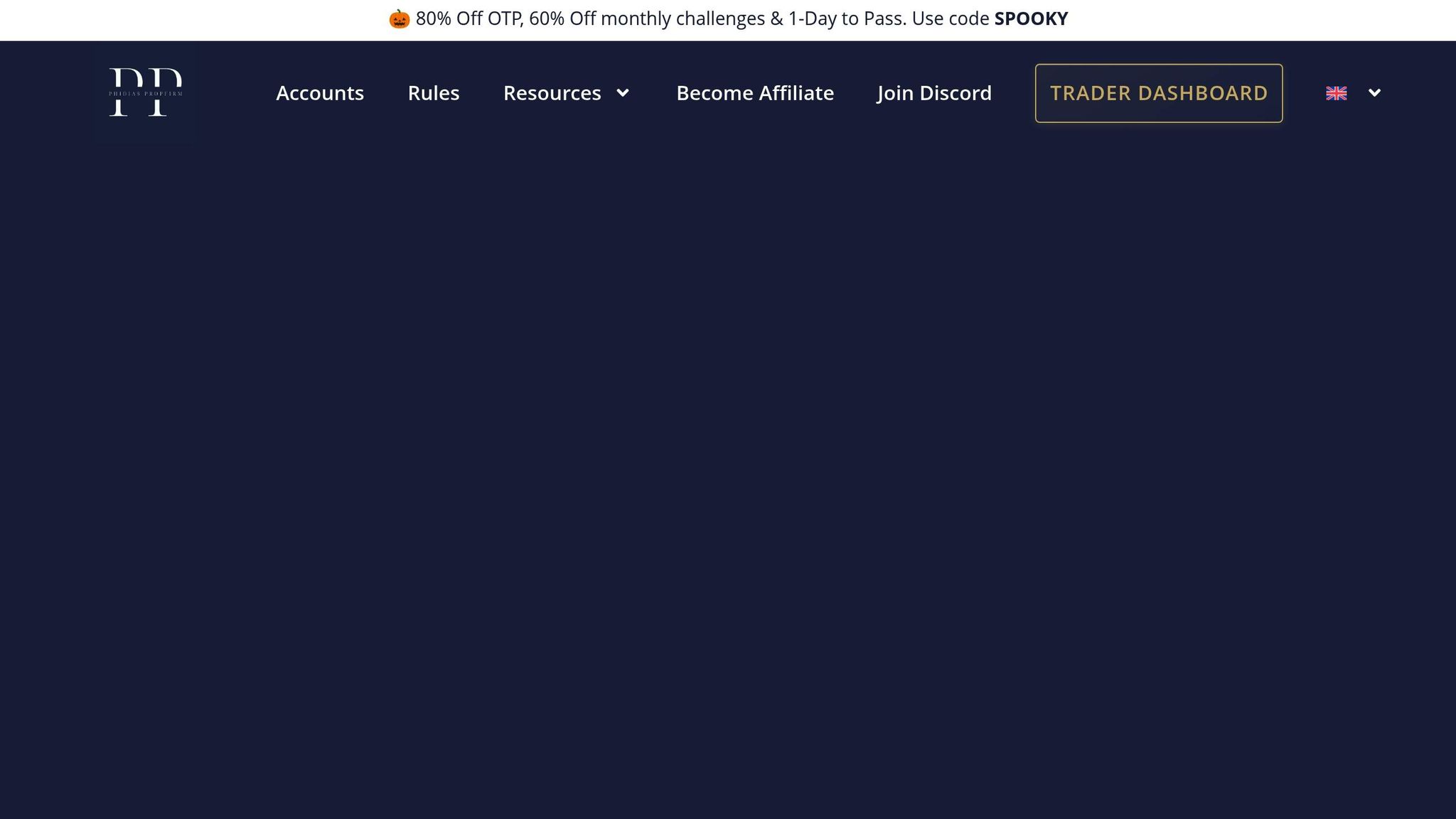
Phidias Propfirm offers a modern evaluation structure, starting with a $25,000 evaluation account as its entry-level option. However, the exact pricing details for this account are not readily available and need to be confirmed directly on their platform. Similarly, the specific breakdown of evaluation fees and any ongoing costs also requires real-time verification.
Details about monthly continuation fees and reset fees are not provided, so it’s essential to check for updates directly with the firm. Additionally, any promotional discounts or offers they may have can change frequently, making it necessary to confirm these details live.
As for platform compatibility, support for popular trading platforms like Rithmic, NinjaTrader, and Quantower has not been confirmed. Traders should verify this information directly to ensure compatibility with their preferred tools.
For those considering Phidias Propfirm, it’s crucial to verify all pricing, fees, and platform support details in real time to get the most accurate and up-to-date information.
9. FundedNext Futures
FundedNext Futures, the futures division of FundedNext, provides two evaluation tracks - Legacy and Rapid Challenge - each with its own pricing and timeline. Here's how the costs break down:
- The Legacy evaluation starts at $72 for a $25K account.
- The Rapid Challenge is priced at $90 for a faster evaluation process.
Both options come with a waived funded setup fee, making them even more accessible. If you need a reset, the fees are $70 for the Legacy plan and $88 for the Rapid Challenge.
When it comes to trading platforms, FundedNext Futures supports Tradovate and NinjaTrader, but Rithmic access isn't available. Both platforms provide real CME futures pricing, and the initial challenge fee covers all real-time market data - no extra monthly charges for exchange data. Tradovate offers a browser-based experience, while NinjaTrader is designed for desktop use, giving traders the flexibility to choose what works best for them.
The one-time evaluation fees keep things straightforward, aligning with the simplicity of other affordable futures evaluations. It’s worth checking for any promotional pricing, as fees can change weekly, ensuring you’re getting the best deal.
10. Tradeify Futures

Tradeify Futures wraps up our list by offering a hybrid pricing model that includes both traditional evaluation and instant funding options. However, one important note: the details about post-funding fees, reset fees, and monthly costs are not disclosed, so it’s crucial to check directly with the firm to get the most up-to-date information.
With the traditional evaluation route, traders pay an upfront fee and must complete specific evaluation phases before gaining access to funding. On the other hand, the instant funding option provides quicker access to live capital but follows a different fee structure. Since the terms and fees can differ significantly between these two paths, reaching out to confirm the latest details is highly recommended. While the fee transparency may leave some questions, this dual-option model makes Tradeify Futures stand out as a flexible choice for traders.
STOP LOSING TO LATENCY
Execute faster than
your competition.
Sub-millisecond execution • Direct exchange connectivity • From $59.99/mo
Another feature worth noting is the potential for Rithmic connectivity, which is particularly appealing for those aiming for low-latency execution - especially when using a Chicago-based VPS. Still, it’s wise to verify the most current platform and fee details directly with Tradeify Futures to ensure there are no surprises.
Pros and Cons
When comparing futures prop firms, several key patterns emerge. These differences often revolve around pricing structures, platform support, and the overall quality of execution. Let’s break down some of the most notable aspects.
Pricing Transparency and Promotional Structure
Some firms, like Apex Trader Funding and Bulenox, are known for their aggressive promotional discounts. For example, Apex Trader Funding periodically offers steep discounts on evaluation fees. However, these promotions can create uncertainty - if you miss the discount window or forget to apply a promo code, you could end up paying the full standard rate.
On the other hand, FundingTicks Futures opts for a more straightforward pricing model. With clear and consistent rates, they avoid relying on promotional tactics. While this approach might not deliver the same dramatic savings as a temporary discount, it makes budgeting more predictable.
My Funded Futures (MFFU) takes a middle-of-the-road approach. Their fee structure is balanced, offering simple reset fees, but their initial evaluation costs tend to be higher compared to firms that heavily rely on promotions.
Platform Support and Technical Infrastructure
Nearly all the firms on this list provide support for Rithmic connectivity, a popular choice among traders. However, support for platforms like Tradovate is less common. Most firms prioritize Rithmic integrations through tools like NinjaTrader or Quantower, which could limit options for traders who prefer Tradovate’s interface.
Monthly Fee Structures
Fee structures are another important consideration. Some firms operate on a recurring monthly fee model, while others charge a one-time evaluation fee. For example, TickTick Trader offers flexibility with month-to-month fees, but these recurring costs can add up over time. In contrast, firms with one-time evaluation fees eliminate ongoing charges, though the initial investment is often higher.
Reset and Scaling Considerations
Reset fees vary widely among firms. Some charge nearly as much as the initial evaluation, while others keep these fees more moderate. Newer firms like Day Traders and Phidias Propfirm are experimenting with competitive pricing to attract traders. However, their long-term pricing stability remains untested compared to older, more established firms.
Platform Reliability and Execution Quality
For traders who rely on Chicago-based VPS hosting to achieve ultra-low latency (sub‑1ms) to the CME, consistent platform performance is critical. FundedNext Futures stands out with its strong global infrastructure, ensuring reliable execution. Smaller firms like Tradeify Futures, however, may not offer the same level of technical support, which could impact trading performance.
One recurring issue across many prop firms is limited fee transparency. Often, traders must contact firms directly to confirm promotional rates, reset fees, and post-funding requirements. This lack of clarity can make cost comparisons tricky and lead to unexpected expenses. Verifying live pricing and understanding all associated fees is crucial when choosing a firm that aligns with your trading strategy.
Conclusion
When exploring the most affordable route to funded status in futures prop trading, FundingTicks Futures stands out with its steady and competitive pricing for 2025. Their straightforward pricing eliminates the guesswork often tied to promotional cycles, making them an appealing choice for traders who value predictability. However, other firms provide unique advantages depending on market conditions and timing.
For traders who can take advantage of promotional offers, Apex Trader Funding and Bulenox frequently provide significant discounts during these windows. Checking live rates is essential to make the most of these opportunities.
Similarly, My Funded Futures (MFFU) offers transparent pricing and reasonable reset fees, which can be a key factor for traders who might need multiple evaluation attempts. This clarity in costs can simplify long-term planning for many.
Ultimately, total funding costs depend heavily on factors like promotional timing and reset fees. Verifying current rates in real time is critical to securing the best deal. For traders managing multiple funded accounts, particularly with copy trading setups, platform reliability becomes a top priority. While some firms excel in providing stable infrastructures, newer names like Day Traders and Phidias Propfirm may still be developing their systems and reputations.
Choosing the most cost-effective option requires careful consideration of promotional timing, reset fees, and platform capabilities. Directly verifying current offers and policies will ensure you make an informed decision that aligns with your trading goals.
FAQs
What should I consider besides the evaluation fee when choosing a futures prop firm?
When choosing a futures prop firm, it’s crucial to dig deeper than just the initial evaluation fee. Be mindful of activation fees, which often come into play when you move to a funded account, as well as any monthly fees that may continue to apply. Over time, these costs can eat into your earnings.
You’ll also want to account for other potential expenses, like live market data fees, platform or connection fees, and payout processing fees. These operational costs can differ widely from one firm to another and may significantly influence your bottom line. Taking the time to evaluate these factors can ensure you’re making a smart, budget-conscious choice.
How do monthly subscription fees, like those from BluSky Trading, affect the total cost of becoming a funded trader?
Monthly subscription fees can play a big role in the overall cost of becoming a funded trader. These recurring payments add to your initial evaluation and activation fees, gradually increasing your total investment over time.
If you're looking to keep costs low, it's essential to compare firms thoroughly. Focus on companies with clear, upfront pricing and consider whether the perks tied to monthly fees - like platform access or extra tools - are worth the extra expense. Make sure to include these fees in your calculations to get a full picture of what it takes to achieve funded status.
What are the pros and cons of choosing a one-time entry fee model like the one from FundingTicks Futures?
A one-time entry fee model comes with the benefit of lower upfront costs, making it appealing for traders aiming to keep their initial expenses manageable. This setup eliminates recurring monthly payments, which can be particularly advantageous for those confident in completing evaluations swiftly.
That said, this model does have its drawbacks. It offers less flexibility if you need extra time to finish the evaluation, as extending or restarting often means paying additional fees. On top of that, firms with monthly fee structures might offer continuous resources or support that a one-time fee option might lack. Weigh your trading objectives and timeline carefully before making a choice.
When choosing a futures prop firm, it’s crucial to dig deeper than just the initial evaluation fee. Be mindful of activation fees, which often come into play when you move to a funded account, as well as any monthly fees that may continue to apply. Over time, these costs can eat into your earnings.
You’ll also want to account for other potential expenses, like live market data fees, platform or connection fees, and payout processing fees. These operational costs can differ widely from one firm to another and may significantly influence your bottom line. Taking the time to evaluate these factors can ensure you’re making a smart, budget-conscious choice.
Monthly subscription fees can play a big role in the overall cost of becoming a funded trader. These recurring payments add to your initial evaluation and activation fees, gradually increasing your total investment over time.
If you're looking to keep costs low, it's essential to compare firms thoroughly. Focus on companies with clear, upfront pricing and consider whether the perks tied to monthly fees - like platform access or extra tools - are worth the extra expense. Make sure to include these fees in your calculations to get a full picture of what it takes to achieve funded status.
A one-time entry fee model comes with the benefit of lower upfront costs, making it appealing for traders aiming to keep their initial expenses manageable. This setup eliminates recurring monthly payments, which can be particularly advantageous for those confident in completing evaluations swiftly.
That said, this model does have its drawbacks. It offers less flexibility if you need extra time to finish the evaluation, as extending or restarting often means paying additional fees. On top of that, firms with monthly fee structures might offer continuous resources or support that a one-time fee option might lack. Weigh your trading objectives and timeline carefully before making a choice.
"}}]}





